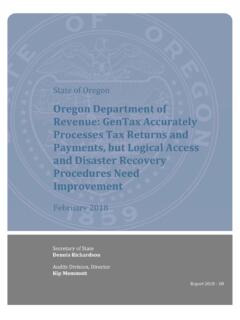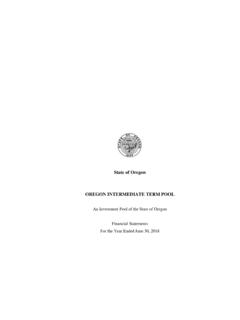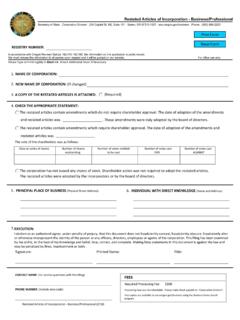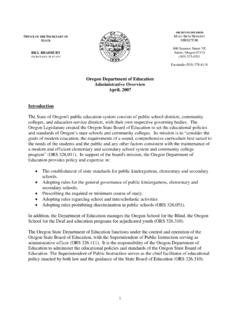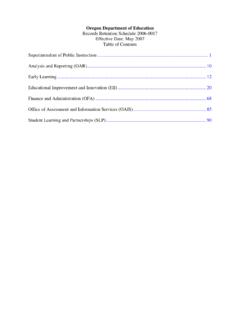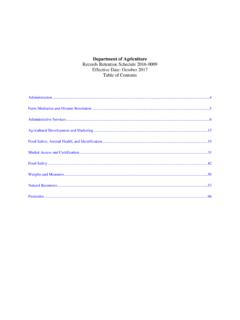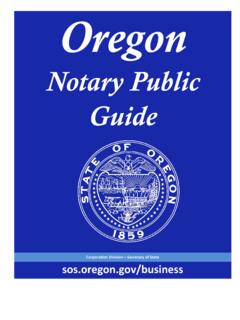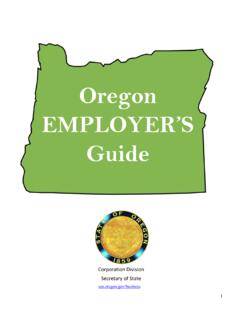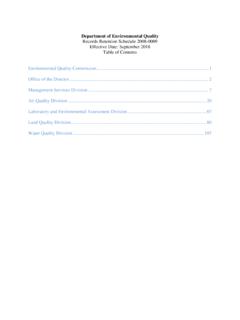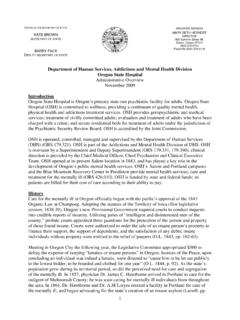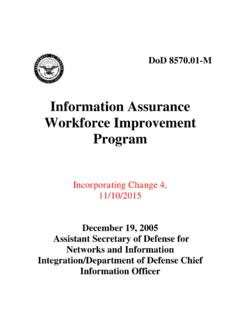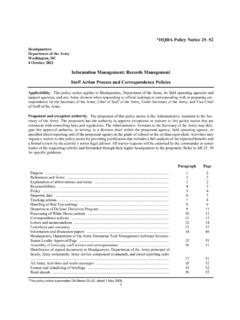Transcription of Restrictions on Political Campaigning by Public Employees ...
1 Restrictions on Political Advocacy by Public Employees Published by Elections Division 255 Capitol St NE Suite 126 Salem OR 97310-0722 503 986 1518 fax 503 373 7414 tty 1 800 735 2900 Adopted by Oregon Administrative Rule No. 165-013-0030 Secretary of State Elections Division Rev. 10/2022 ContentsUsing this Manual 3 Who Must Comply With ORS 4 Candidates and Elected Officials 4 Appointed Board Members and Commissioners 4 Salaried and Hourly Employees 5 Volunteer Personnel at a Public Agency 5 Government Contractors 6 National Voter Registration Act (NVRA) and ORS (3) 6 Overview of Common Activities 6 Notice to Public Employees 7 Use of Public Employee Title 7 Public Employers Discussing Possible Effects of a Measure with Public Employees 7 Distribution of Political Material within an Agency 7 Political Buttons and Clothing 8 Uniforms 8 Union Bulletin Boards 8 Campaign Signs 8 Public Property 9 Public Records 9 Agency Interaction with Media 9 Guest Opinions or Letters to the Editor 9 Contact Lists 9 Emails 10 Websites 10 Social Media (Twitter, Facebook, etc.)
2 10 Images 11 Verbal Communication 11 Public Presentations and Speeches 11 Meetings 11 Forums 12 Advertising 12 Video and Audio Productions 12 Scheduling Political Appearances 12 Visits by Candidate or Candidate Representative 13 Voters Pamphlet 13 Postcards 13 "Get Out The Vote" Materials (GOTV) 13 Government Logos 13 Government letterhead 13 State Seal 13 Resolutions (vote taken) by a Governing Body 13 Petitions and Measures 14 Ballot titles 14 Explanatory statements 14 Lobbying and Legal Challenges 15 Elections Division Review of Materials 16 Who is Liable for Advocacy Material? 16 Submitting Documents for Review 16 Review Process 16 Review Criteria 17 Persuasive or Minimizing Language and Images/Graphics 18 Commonly Used Words or Phrases & Alternatives 18 Unbalanced Language or Content 19 Enforcement 19 Restrictions on Political Advocacy by Public Employees 3 Icons The following icons are used in this manual to emphasize information: alert icon indicates alert; warning.
3 Attention needed info icon indicates additional information deadline icon indicates a deadline example icon indicates an example form icon indicates a reference to a form search icon indicates information located elsewhere Assistance If you have any questions about the material covered in this manual or need further assistance, please contact: Elections Division 255 Capitol St NE Suite 126 Salem OR 97310 503 986 1518 1 866 673 8683 se habla espa ol tty 1 800 735 2900 for the hearing impaired Fax 503 373 7414 Using this Manual This manual sets forth allowable and restricted Political activities by Public Employees , consistent with ORS et seq., and advice from the Attorney General. Any conflict between this manual and ORS must be resolved in favor of the statute. This manual is adopted by Oregon administrative rule (OAR) 165-013-0030 and violations of this rule are to be enforced as violations of ORS Examples and lists are used for illustrative purposes only and are not meant to be exhaustive or exclusive.
4 Also included is information about the Elections Division s prior review process and obtaining safe harbor approval for documents and other materials prior to publication or distribution. When an activity in this manual is referred to as allowable, it means that it does not violate ORS When the activity is referred to as restricted, it means that it does violate ORS and a penalty may be assessed. Essentially, Public Employees may not engage in certain Political activity prohibited under ORS while on the job during working hours or when acting in their official capacity. This manual details what it means to promote or oppose, and when a Public employee is considered to be on the job during working hours. Further, an Attorney General letter dated October 5, 1993 states: Public bodies may use Public funds to inform voters of facts pertinent to a measure, if the information is not used to lead voters to support or oppose a particular position in the election.
5 However, we also have pointed out that informational material may be found to promote or oppose a measure even if it does not do so in so many words if the information presented to the Public clearly favors or opposes the measure and, taken as a whole, clearly is intended to generate votes for or against a measure. Restrictions on Political Advocacy by Public Employees 4 Who Must Comply With ORS All non-elected Public Employees are prohibited from engaging in Political activity proscribed by ORS No person, including elected officials or a Public employer, may direct a Public employee to engage in certain Political advocacy proscribed by the statute. See Candidates and Elected Officials, below. Federal Employees , including persons principally employed by state or local executive agencies in connection with programs financed in whole or in part by federal loans or grants, are covered by the federal Hatch Act, which is administered by the Office of Special Counsel.
6 Candidates and Elected Officials An elected official may engage in Political advocacy during work time. Elected officials are not considered Public Employees for the purposes of ORS An individual appointed to fill a vacancy in an elective Public office is considered an elected official for purposes of this statute. Elected officials cannot request Public Employees who are on the job during working hours or acting in an official capacity to engage in Political advocacy prohibited under ORS A request made by an elected official is considered a command. An elected official's quote, opinion piece, letter or speech advocating a Political position may be published in a Public agency's newsletter or other publication produced or distributed by Public Employees so long as Public Employees did not alter or edit the content in a substantive way. Equal access must be granted to any individual, candidate or Political committee.
7 See Material Produced by Governing Bodies, page 16. See Voters' Pamphlet, page 13, for an exception to this standard. Public Employees may not prepare advocacy material, including but not limited to the text for a speech, a press release, constituent mail that advocates a vote, candidate filing forms, voters pamphlet filing forms, file contribution and expenditure transactions online, etc. during their work time. An elected official, as part of a governing body, may vote to support or oppose a measure under consideration for referral. The elected official may publicly discuss the vote. Elected officials may not use Public employee staff time to develop Political advocacy proscribed by ORS , except for administrative functions. An elected official may only solicit volunteer help from Public Employees during employee breaks or other personal time. Appointed Board Members and Commissioners ORS applies to all appointed board and commission members when they are acting in their official capacity.
8 This includes, but is not limited to, attending a meeting of the board or commission, working on a duty assigned by the board or commission, working on official publications (including website materials) for the board or commission, or when appearing at an event in an official capacity. Appointed board or commission members may use their titles to engage in Political advocacy (including endorsing candidates, measures, etc.) so long as they are not acting in their official capacity when making the endorsement or authorizing the use of their title. A candidate approaches a planning commission board member and asks for their endorsement. The candidate asks if they can use the board member's title, and the board member agrees. This is allowable if the board member was on their personal time when they authorized the endorsement. A candidate, attending a planning commission meeting, asks the board members for an endorsement and some board members agree.
9 The board members are not allowed to do this because they are at a meeting and therefore acting in an official capacity. See Use of Public Employee Title on page 7 for more information. Restrictions on Political Advocacy by Public Employees 5 Salaried and Hourly Employees Hourly Employees work time includes any time they are on the job during work hours which includes any time for which the employee is compensated. This includes, but is not limited to, regular work hours, overtime, travel or conferences. Activities associated with attending a conference, such as award dinners or other sponsored events, could qualify as being on the job during working hours and are subject to the provisions of ORS Salaried Employees work time is not as easily measured as hourly workers. If the work performed falls generally within the job duties of the Public employee, the work is deemed to be performed in an official capacity regardless of the time of day or location.
10 If a salaried employee applies for expense reimbursement for a function or event, the employee is deemed to be on the job during working hours for the applicable time period. A regular workday may not be defined for a position, or may not have a specific time period or schedule. Whether the employee is on the job during work hours is determined by the activities performed and whether the person is acting, or appears to be acting, in an official capacity. The Elections Division suggests that salaried Employees keep personal notes to record when they are on or off duty. During Public appearances, the employee is encouraged to specifically announce to the audience that they are not acting in their official capacity. However, such an announcement would not negate a subsequent statement or action that indicates the Public employee is acting in his or her official capacity (such as handing out official publications, or speaking on behalf of the Public employer).
